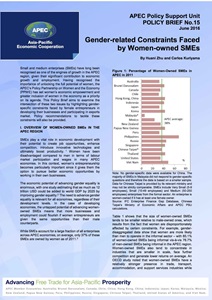Gender-related Constraints Faced by Women-owned SMEs

| Published Date | June 2016 |
|---|---|
| Type of Publication | Reports |
| Publication Under | APEC Secretariat, APEC Policy Support Unit |
| Accessed | 16191 |
| Pages | 10 |
| Download publication | Download |
Description
This policy brief examines the gender-related constraints faced by women-owned SMEs and provides some policy recommendations to address this issue.
Within APEC, four main categories of constraints that female SME owners face to access to markets have been identified. Firstly, it has been harder for female entrepreneurs to identify opportunities to expand and internationalize, in part due to lack of relevant skills and networking opportunities. Secondly, unequal access to financial resources from state-owned financial institutions and government agencies has been affecting negatively female entrepreneurs. Thirdly, unfavorable institutional and regulatory framework has made it more difficult for female SME owners to effectively collateralize their assets or to deal with regulations and procedures. Lastly, cultural and social norms on various issues, ranging from gender division of housework to women’s business leadership skills, have been posing additional challenges on female entrepreneurs.
Within APEC, four main categories of constraints that female SME owners face to access to markets have been identified. Firstly, it has been harder for female entrepreneurs to identify opportunities to expand and internationalize, in part due to lack of relevant skills and networking opportunities. Secondly, unequal access to financial resources from state-owned financial institutions and government agencies has been affecting negatively female entrepreneurs. Thirdly, unfavorable institutional and regulatory framework has made it more difficult for female SME owners to effectively collateralize their assets or to deal with regulations and procedures. Lastly, cultural and social norms on various issues, ranging from gender division of housework to women’s business leadership skills, have been posing additional challenges on female entrepreneurs.

